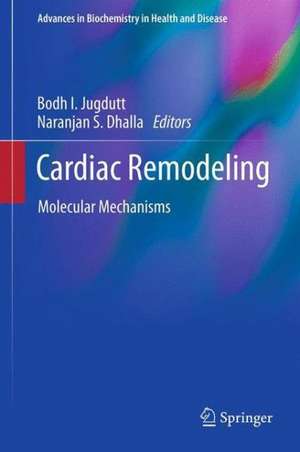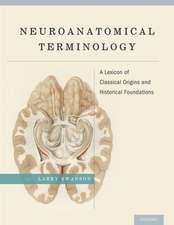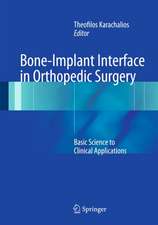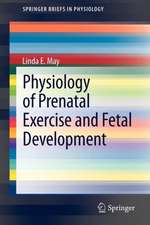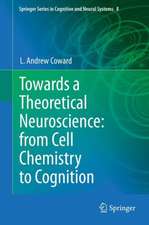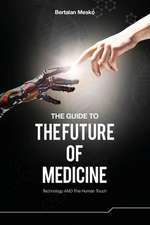Cardiac Remodeling: Molecular Mechanisms: Advances in Biochemistry in Health and Disease, cartea 5
Editat de Bodh I. Jugdutt, Naranjan S. Dhallaen Limba Engleză Hardback – 16 feb 2013
| Toate formatele și edițiile | Preț | Express |
|---|---|---|
| Paperback (1) | 1109.96 lei 6-8 săpt. | |
| Springer – 6 mar 2015 | 1109.96 lei 6-8 săpt. | |
| Hardback (1) | 1114.91 lei 6-8 săpt. | |
| Springer – 16 feb 2013 | 1114.91 lei 6-8 săpt. |
Din seria Advances in Biochemistry in Health and Disease
- 18%
 Preț: 1241.55 lei
Preț: 1241.55 lei - 5%
 Preț: 1290.27 lei
Preț: 1290.27 lei - 5%
 Preț: 1462.77 lei
Preț: 1462.77 lei - 5%
 Preț: 1291.01 lei
Preț: 1291.01 lei - 5%
 Preț: 1103.75 lei
Preț: 1103.75 lei - 5%
 Preț: 1430.35 lei
Preț: 1430.35 lei - 18%
 Preț: 1126.52 lei
Preț: 1126.52 lei - 15%
 Preț: 647.40 lei
Preț: 647.40 lei - 5%
 Preț: 1107.21 lei
Preț: 1107.21 lei - 18%
 Preț: 958.07 lei
Preț: 958.07 lei - 18%
 Preț: 1237.48 lei
Preț: 1237.48 lei - 18%
 Preț: 957.94 lei
Preț: 957.94 lei - 5%
 Preț: 1213.78 lei
Preț: 1213.78 lei - 24%
 Preț: 898.17 lei
Preț: 898.17 lei - 5%
 Preț: 670.95 lei
Preț: 670.95 lei - 18%
 Preț: 1225.48 lei
Preț: 1225.48 lei - 24%
 Preț: 835.46 lei
Preț: 835.46 lei - 5%
 Preț: 1025.14 lei
Preț: 1025.14 lei - 18%
 Preț: 1121.62 lei
Preț: 1121.62 lei - 5%
 Preț: 1018.44 lei
Preț: 1018.44 lei - 5%
 Preț: 1108.35 lei
Preț: 1108.35 lei - 5%
 Preț: 1320.04 lei
Preț: 1320.04 lei - 5%
 Preț: 1104.48 lei
Preț: 1104.48 lei - 5%
 Preț: 1388.52 lei
Preț: 1388.52 lei - 5%
 Preț: 1321.45 lei
Preț: 1321.45 lei - 18%
 Preț: 964.71 lei
Preț: 964.71 lei - 5%
 Preț: 1119.47 lei
Preț: 1119.47 lei - 5%
 Preț: 1116.73 lei
Preț: 1116.73 lei
Preț: 1114.91 lei
Preț vechi: 1173.60 lei
-5% Nou
Puncte Express: 1672
Preț estimativ în valută:
213.35€ • 223.03$ • 180.29£
213.35€ • 223.03$ • 180.29£
Carte tipărită la comandă
Livrare economică 06-20 martie
Preluare comenzi: 021 569.72.76
Specificații
ISBN-13: 9781461459293
ISBN-10: 146145929X
Pagini: 584
Ilustrații: XI, 569 p. 78 illus., 46 illus. in color.
Dimensiuni: 155 x 235 x 37 mm
Greutate: 0.93 kg
Ediția:2013
Editura: Springer
Colecția Springer
Seria Advances in Biochemistry in Health and Disease
Locul publicării:New York, NY, United States
ISBN-10: 146145929X
Pagini: 584
Ilustrații: XI, 569 p. 78 illus., 46 illus. in color.
Dimensiuni: 155 x 235 x 37 mm
Greutate: 0.93 kg
Ediția:2013
Editura: Springer
Colecția Springer
Seria Advances in Biochemistry in Health and Disease
Locul publicării:New York, NY, United States
Public țintă
ResearchCuprins
Part I: Molecular mechanisms of remodeling in pressure and volume overload hypertrophy and ehart failure.- β-adrenergic receptor signaling pathway in heart failure.- Remodeling of potassium channels in cardiac hypertrophy.- Role of gender in Ca2+ cycling and cardiac remodeling due to heart failure.- The failing heart: is it an inefficient engine or an engine out of fuel?.- Regulation of cardiac hypertrophic remodeling by the USP15/SLIM1 pathway.- Role of galectin-3 pathways in the pathogenesis of cardiac remodeling and heart failure.- A mitochondriocentric pathway to cardiomyocyte necrosis: an upstream molecular mechanism in myocardial fibrosis.- The ACE2/Ang (1-7) pathway in cardiac remodeling due to pressure-overload.- Local actions of natriuretic peptides and nitric oxide in cardiac remodelling: Implications for therapy.- Modulating G protein-coupled receptors to effect reverse cardiac remodeling.- Role of inflammation and matrix proteinases in cardiac remodeling following stress and injury.- Role of chymase in matrix and myocardial remodeling due to mitral regurgitation. Implications for therapy.- Cardiac remodeling due to aortic regurgitation and mitral regurgitation.- Reducing oxidative stress and manipulating molecular signaling events using resveratrol as a therapy for pathological cardiac hypertrophy.- Angiogenesis, arteriogenesis, and mitochondrial dysfunction.- Part II: Molecular mechanisms of remodeling after myocardial injury and infarction.- Subcellular remodeling and cardiac dysfunction due to ischemia-reperfusion injury.- Role of microRNAs in cardiac hypertrophy and post-infarction remodeling.- Negative regulators of inflammation as endogenous protective mechanisms in post-infarction remodeling.- TLR-dependent pathways and Akt/mTOR/P70S6K pathways in cardiac remodeling after myocardialinfarction.- The STAT3 pathway and downstream mechanisms in cardiac remodeling: Friend or foe.- The role of growth differentiation factor 5 in cardiac repair post myocardial infarction.- Extracellular matrix biomarkers of adverse remodeling after myocardial infarction.- Oxidative stress in cardiac repair and remodeling: Molecular pathways and therapeutic strategies.- Role of SPARC in cardiac extracellular matrix remodeling after myocardial infarction.- Tissue inhibitor of matrix metalloproteinases in the pathogenesis of heart failure syndromes.- Intracellular matrix remodeling and cardiac function in ischemia-reperfusion injury.- Aging and markers of adverse remodeling after myocardial infarction.- Optimizing stem cell therapy for cardiac repair following a myocardial infarction.- Regulation of fibrosis after myocardial infarction. Implications for ventricular remodeling.- The ACE2/Ang-(1-7) pathway in cardiac fibroblasts as a potential target for cardiac remodeling.
Caracteristici
First research-oriented volume to bring together diverse translational research and scattered information on heart failure Summarizes major research advances in molecular, biochemical and translational aspects of cardiac remodeling over recent decades Highlights areas needing further study, from key molecules and pathways to novel strategies Includes supplementary material: sn.pub/extras
